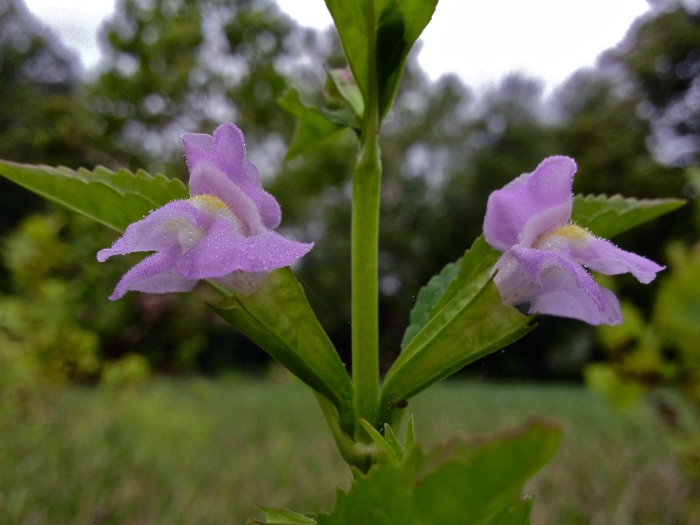Sharpwing Monkeyflower
(Mimulus alatus)
Sharpwing Monkeyflower (Mimulus alatus)
/
/

Fritz Flohr Reynolds
CC BY-SA 2.0
Image By:
Fritz Flohr Reynolds
Recorded By:
Copyright:
CC BY-SA 2.0
Copyright Notice:
Photo by: Fritz Flohr Reynolds | License Type: CC BY-SA 2.0 | License URL: https://creativecommons.org/licenses/by-sa/2.0/ | Uploader: FritzFlohrReynolds | Publisher: Flickr |


















































Estimated Native Range
Summary
Mimulus alatus, commonly known as Sharpwing Monkeyflower, is a herbaceous perennial native to wet meadows, marsh edges, and stream banks in Eastern North America. It typically grows 15 to 91 cm tall, with a rapid growth rate and a relatively short lifespan. The plant features green foliage and striking blue to violet flowers that bloom from June to September. The flowers are 2.5 cm long, bilaterally symmetrical, and appear individually on the plant. Although not fragrant, the flowers are visually appealing with their unique shape and vibrant color.
Sharpwing Monkeyflower is valued for its ornamental flowers and ability to thrive in wet conditions, making it suitable for rain gardens, water features, and naturalized areas. It is also used for riparian plantings to stabilize stream banks. The plant’s preference for moist environments means it requires high amounts of water and does well in full sun to part shade. It is adaptable to a range of soil pH from slightly acidic to neutral (5.6-7.5) and benefits from organic-rich soils. While it can tolerate occasional flooding, it is not frost-tolerant and cannot survive temperatures below -23 °F (-30.5 °C). Foliar diseases are rare, but the plant may struggle in dry, sunny conditions, becoming stunted and yellowish-green.CC BY-SA 4.0
Sharpwing Monkeyflower is valued for its ornamental flowers and ability to thrive in wet conditions, making it suitable for rain gardens, water features, and naturalized areas. It is also used for riparian plantings to stabilize stream banks. The plant’s preference for moist environments means it requires high amounts of water and does well in full sun to part shade. It is adaptable to a range of soil pH from slightly acidic to neutral (5.6-7.5) and benefits from organic-rich soils. While it can tolerate occasional flooding, it is not frost-tolerant and cannot survive temperatures below -23 °F (-30.5 °C). Foliar diseases are rare, but the plant may struggle in dry, sunny conditions, becoming stunted and yellowish-green.CC BY-SA 4.0
Plant Description
- Plant Type: Herb
- Height: 1-3 feet
- Width: 0.8-1.5 feet
- Growth Rate: Rapid
- Flower Color: Blue, Purple
- Flowering Season: Summer
- Leaf Retention: Deciduous
Growth Requirements
- Sun: Full Sun, Part Shade
- Water: High
- Drainage: Medium, Slow
Common Uses
Bee Garden, Bird Garden, Butterfly Garden, Deer Resistant, Hummingbird Garden, Low Maintenance
Natural Habitat
Wet meadows, marsh edges, and stream banks in Eastern North America
Other Names
Common Names:
Scientific Names: , Mimulus alatus,
GBIF Accepted Name: Mimulus alatus Sol.